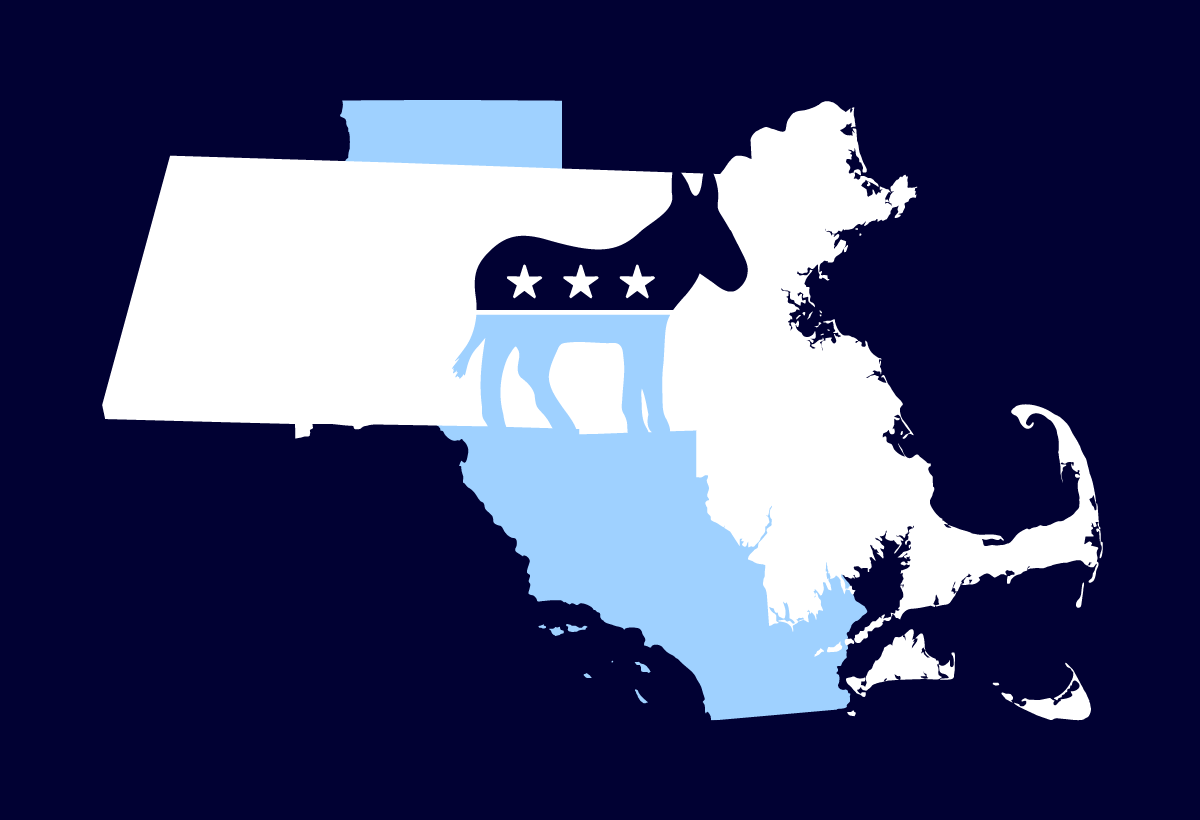
By Samuel Trachtman
In May, BESI co-hosted a virtual convening with Yale’s American Political Economy eXchange (APEX), exploring the promises and challenges of governance in states controlled by Democrats. We are now pleased to post video recordings from the convening, which you can view below. Though we cannot cover all of the productive conversation — for that, we encourage you to watch the recordings — we want to draw out three broad takeaways related to:
- How Democratic trifectas affect the party’s brand.
- The challenge of policy implementation in solid blue states.
- The importance of pragmatic coalition management.
Overall, the panels affirmed the importance of good governance in blue states not just for the people living there, but for the national party brand and for American democracy. But they also bore out the difficult challenges of managing coalitions to design and implement policies that help address blue states’ big problems.
1. Democratic trifectas are currently a drag on the national party brand — but they don’t have to be.
In the first session, political strategist Arkadi Gerney presented striking new polling data on Americans’ perceptions of the policy performance of four states: California, New York, Florida, and Texas. The data show that, across a wide swath of issues, the population as a whole tends to have a much more negative view of policy performance in blue strongholds California and New York than in Florida and Texas. Perceptions were particularly negative on issues like housing affordability, overall cost of living, homelessness, tax fairness, and public safety and crime. On the other hand, respondents generally viewed California and New York more favorably on such issues as reproductive health care and voting access and election security.
Puzzlingly, perceptions of California and New York were negative both for issues that the states objectively struggle with (e.g., housing affordability) and for issues for which those two states are generally no worse than others (e.g. public safety and crime). In Gerney’s interpretation, this suggests that Democrat-controlled states face both a governance problem and a messaging problem. But regardless of the extent to which negative views of major Democratic states are driven by objective reality versus bias, the data indicate that perceptions of Democratic governance in blue states are likely driving voters away from the Democratic party.
Apart from Gerney’s polling numbers, there was clear evidence across the panels of governance and policy failures in blue trifectas in the critical arenas of housing and climate. At the same time, the panels demonstrated significant variation in Democratic policy performance. For instance, the housing panel suggested a clear contrast between the relative success of Washington State in navigating coalitional challenges to pursue effective housing production policy, and California’s general failure to do so. In addition, OpenNY executive director Anne-Marie Gray highlighted the success of housing advocates at achieving reform in New York City, but failure at the state level. This variation suggests there is nothing pre-ordained about policy and governance struggles in blue trifectas, and that there are lots of opportunities for Democrats to improve policy and governance in the states where they hold majorities.
2. The nationalization of American politics is making it harder to hold state-level politicians accountable for policy implementation. This is a problem for blue strongholds.
We know from political science research that state politics has grown increasingly nationalized over the past few decades. What this means is that the decisions of voters in state elections are increasingly driven by their views with respect to the national parties and national policy issues. In states that lean Democratic, this dynamic has generally led to Democrats bolstering their majorities, and Republicans failing to mount serious challenges for control of the legislature and Governor’s office (the reverse is true in states like Texas that lean Republican). At the extremes, states like California are moving closer to one-party states, with Democrats retaining consistent super-majorities largely regardless of how well they actually govern.
This creates an accountability problem. In the absence of a credible electoral threat, Democratic lawmakers have less incentive to work together to pass and implement effective policy to maintain and build voter support. The lack of electoral competitiveness in general elections may also increase the leverage of interest groups that play an important role in low-turnout primaries. As Kate Gordon, CEO of California Fwd, stated, “In general, California has not met a lot of the goals we have set, and I would argue that the messy work of implementation is a challenge with the level of dominance of one party that we have.” Similarly, reflecting on governance in New York, NYU Law Professor Vicki Been said, “We have to find better ways of holding people accountable. Cheap talk is very prevalent. Getting beyond how many bills you passed and how many flowery things you said to really hold people’s feet to the fire about the results of their actions.”
Speakers on the housing panel also emphasized lack of accountability, driven by the nationalization of elections, as a root cause of housing policy challenges. Yale Law Professor David Schleicher observed, “There’s no particular reason to think state legislative elections will produce accountable results, because people are not voting based on the things state legislators decide… the fact that housing prices are extraordinarily high in California and Massachusetts has not produced any bad results for Democrats in those states.” And in the context of decarbonization, California climate policy expert David Weiskopf emphasized that bigger majorities in California have not necessarily translated to stronger climate policies. Other speakers on the decarbonization panel also noted how blue trifecta states have often enacted strong greenhouse gas reduction targets, but struggled to implement the policies to actually achieve them.
3. Effective governance in blue trifectas requires pragmatic coalition management
When facing close competition with Republicans, coalitions within the Democratic party have a strong incentive to put aside their differences and work together to overcome Republican challenges and win legislative majorities. But as the nationalization of elections has allowed Democrats to gain larger majorities in more urbanized states, Democratic intra-coalitional tensions have loomed larger. As Colorado Communique Principal and long-time Colorado Democratic operative Collon Kennedy put it: “How do you govern when the same folks who got you elected are at opposite ends on an issue?”
The panels demonstrated how the ability to successfully resolve intra-coalition tensions has been critical to effective governance and problem-solving. On the climate panel, for instance, Evergreen Action co-founder Sam Ricketts noted how winning a Democratic trifecta in Washington State did not automatically translate into stronger climate policy. Industrial labor unions, which had significant sway within the Democratic coalition, stood in the way of passing the market-based climate policies leading environmental groups favored. Bringing unions on board required shifting to targeted sectoral reforms that included labor requirements. Unlike market-based policies, these successfully moved through the legislature. More broadly, Columbia professor Alex Hertel-Fernandez and Climate Jobs Institute director Lara Skinner emphasized the ways that unions can help Democrats deliver clean energy infrastructure in the states that they govern– even if they tend to oppose certain types of climate policies.
Similarly, in the housing space, Futurewise director Alex Brennan noted how advocates in Washington built a broad coalition of groups that don’t always agree — including environmental groups, labor unions, and equity groups — to work together on pro-supply policy. Disagreements were ironed out as groups compromised for the sake of the broader reform program. In New York City, Annemarie Gray mentioned how supply-oriented advocates were able to broaden their coalition by emphasizing the ways that wealthier parts of the city misuse zoning to exclude minorities and push new development to poorer parts of the city. This framing helped build a coalition of 120 groups, including many that generally focus on tenant protections, ultimately supporting recent upzoning as part of City of Yes reforms.
Yet, in other cases, inability to productively manage intra-coalition tensions has led to governance failures. Vicki Been noted how ideological purity can often serve as a stumbling block. She recalled how, during her time in the Mayor’s office, homeless advocates in New York City refused to get behind any new housing that was not 100% publicly subsidized affordable. She also emphasized how overly restrictive labor requirements, put in place to maintain union support, can sometimes render programs unworkable, or drive program costs so high that they lose public support. Similarly, in the California housing context, UC Davis Law Professor Chris Elmendorf criticized California lawmakers for enacting a whole slew of housing supply policies that have not actually moved the needle much on housing production. Maintaining support for policy reforms from powerful labor and equity groups has required labor requirements and publicly subsidized affordable units set-asides. Because these provisions make it harder and more costly for developers to use those new policies to produce units, the impact of new laws on actual housing production has been disappointing..
Reform in blue trifectas will require crafting policies that have significant support among key Democratic-party groups — and in particular, unions. Yet, party leaders must also be willing to push those groups to compromise to ensure that policies also produce broad public benefits. And as David Schleicher emphasized, it is not just about managing the Democratic coalition. For housing in particular, which divides the Democratic party, advocates have made major policy gains by reaching across the aisle for Republican votes.
Watch: Blue trifectas virtual convening
about the author

Samuel Trachtman is a senior researcher at BESI, where he leads the Political Economy of California research program. The goal of the program is to produce research insights that help policymakers in state government to overcome political barriers and advance policies that mitigate California’s affordability problem. Trachtman received his Ph.D. in Political Science from UC Berkeley, and has published widely in journals including American Political Science Review, Energy Policy, Governance, Nature Energy, Public Opinion Quarterly, and Perspectives on Politics.

